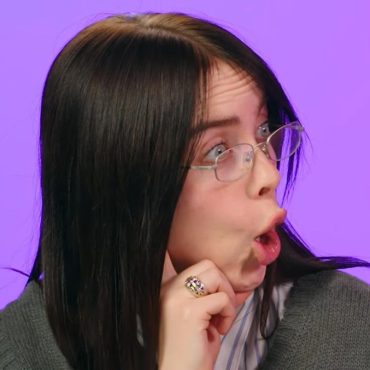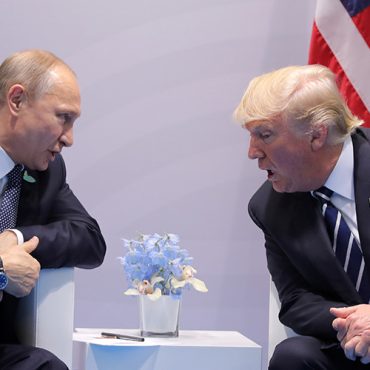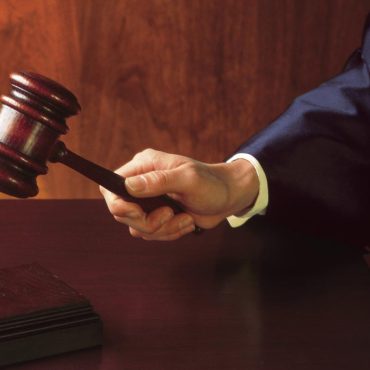This is a rush transcript. Copy may not be in its final form.
AMY GOODMAN: This is Democracy Now!, democracynow.org, The War and Peace Report. I’m Amy Goodman, as we continue our look at this new documentary, The Encampments, about the historic Columbia University Gaza solidarity encampment and the nationwide student uprising against U.S. support for Israel’s war on Gaza. The film prominently features Mahmoud Khalil, the Columbia graduate student protest negotiator who was seized by federal agents three weeks ago and remains locked up in an ICE jail in Louisiana. There is a court hearing for him today in New Jersey. This is a clip of Mahmoud Khalil from the documentary.
MAHMOUD KHALIL: I was approached the night of the encampment that I would be the person communicating with the administration. The organizers trusted me, given my background in terms of, like, working in diplomacy either at the British Embassy or here at the U.N. We discussed who’s best, too, to support me, and we felt that Sueda is the perfect person.
SUEDA POLAT: The university wanted to shut down the encampment in any way that it could. When it first started, they were like, “Let’s not let them bring in water. Let’s shut down all of the gates. Let’s not let them bring in tents. Let’s not let them bring in blankets,” because it was cold. It was freezing.
MAHMOUD KHALIL: They underestimated the will of the students. They literally, like, feel that these are just kids. Through my conversation, I just felt how much the university is detached from reality. What university in the world want to invest in weapon manufacturers? Why would you do that? You’re concerned with education. Like, we are literally giving you back the university to be a moral university. Every time in the negotiations when we told them that, they would say, like, “Oh, you’re overestimating your power or your influence.” But then, after the fourth day, they were just like so silent, because clearly it’s a global movement. I remember, like, telling them, like, at this point there are 60 universities setting up encampments across the United States. They’re just like waiting to hear what would happen at Columbia.
AMY GOODMAN: That was Mahmoud Khalil, the graduate student protest organizer and negotiator with the university, who’s in this film, featured in The Encampments.
We’re joined by three guests. Munir Atalla is the producer of The Encampments, head of production and acquisitions at Watermelon Pictures. He was a Columbia adjunct professor of film last spring. Grant Miner is also with us, the president of the Student Workers of Columbia, UAW 2710. He was expelled by Columbia for taking part in the pro-Palestine campus protests. He was fired as a graduate worker one day before his union entered bargaining talks. He’s president of the local UAW at Columbia. And Sueda Polat is with us, graduate student in human rights at Columbia University. Along with Mahmoud, she negotiated between the student activists and the Columbia administration.
Sueda, I want to begin with you. It’s also where the film begins, very movingly, as you talk about why you even came to Columbia as a graduate student in human rights, that that’s not a common major.
SUEDA POLAT: It most definitely isn’t a common major. This is my graduate degree. And prior to that, I was in sociology. But before starting at Columbia University, I spent some time in Palestine, particularly in the West Bank. And I think it was — just seeing the strangulation of life in Palestine, the squashing of people and the regular indignities that they’ve been exposed to in their everyday life, I think, was a very transformative political moment for me.
And upon returning from the West Bank, I knew I wanted to work on the Palestinian liberation movement. And in the United States, Columbia University had the strongest record particularly for Palestine, with the Center for Palestine Studies, as well as being like a host for so many scholars of Palestine, of Edward Said, of Joseph Massad and so many other professors. And it was also known as being a protest school. And I felt that it would be the right fit. But I was sorely mistaken.
AMY GOODMAN: So, how did you end up being a chief negotiator between the students and the university, along with Mahmoud? So, the two of you worked side by side as you met with the administration.
SUEDA POLAT: I think the first few days of the encampment, particularly, were very confusing for a lot of people. On the first night of the first encampment, prior to the arrests, is when the administration first reached out, wanting to talk about what our demands were. At the time, like Mahmoud said in the documentary, he had a lot of experience in diplomacy, but he didn’t want to go in alone. And some of my friends recommended me to meet with the administration with him.
AMY GOODMAN: And what do you mean he had experience in diplomacy?
SUEDA POLAT: I mean, he’s been working at the Palestine Mission at the United Nations. He’s at SIPA, where he studies a lot of diplomacy, international relations.
AMY GOODMAN: The School of International Affairs at Columbia.
SUEDA POLAT: Yes, the School of International Affairs at Columbia University. And he’s also — you know, he’s 30 years old. He’s very experienced. He’s a diplomat through and through. So he was a good choice.
AMY GOODMAN: So, I want to go to another clip from the film Encampments.
SUEDA POLAT: The genocide did not start on October 7th. Neither did the pro-Palestinian movement generally on campus. Students had already pushed, like, divestment referendums in previous years. We had voted on divestment referendums at various colleges within Columbia. All of them passed.
NAYE IDRISS: Immediately, the president sent out an email saying, “We don’t have actual general consensus amongst the student body or amongst our community,” in which they include in the community the Columbia alumni.
Free, free Palestine!
PROTESTERS: Free, free Palestine!
NAYE IDRISS: Free, free, free Palestine!
PROTESTERS: Free, free, free Palestine!
NAYE IDRISS: What do we want?
PROTESTERS: Justice!
NAYE IDRISS: When do we want it?
PROTESTERS: Now!
GRANT MINER: We had done everything we could think of. We did peaceful protest. That was ignored. We did strategic interruptions. That was ignored and punished. Students had written up this whole divestment proposal, saying that it is not only possible, but would be easy. And that was just dismissed out of hand.
MAHMOUD KHALIL: They changed all the protest rules. They wouldn’t approve any of our events. They would just criminalize anyone who would participated in a protest.
GRANT MINER: If they were just going to ignore us, then we had to do something that couldn’t possibly be ignored by the administration.
AMY GOODMAN: Another clip from The Encampments. And one of the voices there was Grant Miner, the president of Student Workers of Columbia, UAW 2710. He’s been fired and expelled, a fifth-year grad student. Grant, you’re also Jewish American. Can you talk about why you participated in this? And address directly the issue of somehow the encampments creating an antisemitic environment. When Democracy Now! went to cover it, so many of the students involved were Jewish students.
GRANT MINER: Yes. I mean, why I participated in it, there’s a number of reasons. I’m a labor organizer. It’s really important to our members that we had a firm, firm stance on this. We are a social justice union. The UAW, more broadly, practices social justice unionism.
AMY GOODMAN: And you were a graduate instructor.
GRANT MINER: Yes, yes. And so, you know, it was important that we were there. I think, as a Jewish person, as well, it was important to me that we be visible in the Palestine movement.
And I guess to address the sort of specter of antisemitism in the encampments, I mean, to be honest with you, it’s just not something I have ever experienced in the Palestine movement. The encampments, in particular, were enormously welcoming. We had, you know, services. The encampments coincided with Passover. There were actually members of the Jewish studies faculty that would come into the encampment and speak and be in community with Jewish students.
AMY GOODMAN: I wanted to go to another clip of The Encampments, with the Jewish student protesters at Columbia and their allies taking part in a Havdalah service. The clip features the Israeli American Rabbi Abby Stein.
RABBI ABBY STEIN: We are here — and if anyone here disagrees with me, you can tell me, but I think we are here because we are Jews, not just because we happen to be, because that is part of who we are, to fight for liberation of every human being, to know that every human being is a divine image. That is what we’re doing right now. And we are separating ourselves from people who are somehow incapable of seeing that. We are fighting for the divine spark, for b’tselem elohim in every person. You are all so amazing, and it’s an honor to be here with you.
JEWISH STUDENT: If you’re familiar with the Havdalah service, please sing loudly and proudly. If you’re not, please sing loudly and proudly. It is very Jewish to not know the words and not know everything, but you’ll catch on.
JEWISH STUDENTS: [singing] Bein Yisrael la’amim, bein yom ha’shevi’i l’sheishet y’mei ha’ma’aseh. Baruch atah…
AMY GOODMAN: Another clip from The Encampments. Grant, you have just been expelled. That’s not just losing your job. That’s your five years that you’ve been a graduate student. You’re not getting your Ph.D.? On what grounds were you expelled?
GRANT MINER: I was expelled for participating in pro-Palestinian protests. I mean, functionally, I was expelled for speaking out against genocide. And, you know, it was really shocking. I mean, I learned this as I was away doing research on a departmental grant. And it was tough to learn that Columbia was, you know, more than willing to just totally concede to Trump, to throw its students under the bus, to throw international students especially under the bus, just to get back some money and to please the administration.
AMY GOODMAN: I mean, this is a very frightening time. You not only have Mahmoud who is jailed in Louisiana, you have another student who has left the country because her visa was revoked, this star student. Munir Atalla, you are the producer of The Encampments. It’s opening in what? New York, Los Angeles next week and beyond?
MUNIR ATALLA: That’s right. This is a film that’s going to be opening here in New York this weekend, and then we’ll take it nationwide next weekend. Already the demand has been very strong. I think people are eager to see the encampments from within, from the student perspective. Most of the coverage of the encampments to date has been from people who actually never even set foot on the encampments, whereas for us, you know, I was an adjunct professor at Columbia last spring, and we witnessed the student movement.
AMY GOODMAN: So, you’re teaching film there. You were.
MUNIR ATALLA: Right, yeah, exactly. Actually, a lab in documentary production. And some of our students even chose to cover this as part of their work. But, you know, what we witnessed —
AMY GOODMAN: I saw many of the Columbia journalism students. It was quite something, what they were doing. They had a little more access than other reporters because the university had shut down the campus.
MUNIR ATALLA: Absolutely, yeah. No, I mean, Columbia has gone to every extent to try and censor this movement and be really a leader in repressing it, as well. Let’s not forget, this was the largest student movement in U.S. history. And, you know, the students have always been on the right side of history. Columbia’s own history shows that. They were on the right side in the 1960s during the civil rights movement. They were on the right side in the ’90s in the fight against apartheid.
AMY GOODMAN: I wish Juan was joining me in this conversation, Juan González, our co-anchor of Democracy Now!, because he participated in the Columbia 1968, basically, you could say, encampment, occupation. And you go back and forth in the film.
MUNIR ATALLA: That’s right, you know? And just as the students stood on the right side of history in the past, so, too, are they standing on the right side of history today. And their demands for disclosure of financial assets, their demand for Columbia to invest its multibillion-dollar endowment from arms companies is not only a righteous and just demand, but it is inevitable. And the sooner Columbia sees that, the more embarrassment and shame it can save itself. You know, can you even call Columbia a university anymore? A university has the obligation to protect its students. A university has the obligation to stand by the core values of academic institutions, freedom of expression and speech.
AMY GOODMAN: Well, we’re going to have to leave that question there, but the film comes out around the country starting tonight in New York and then going beyond. I want to thank you all for being with us, Munir Atalla, producer of The Encampments; Grant Miner, president of Student Workers of Columbia, UAW, just fired and expelled by Columbia; and Sueda Polat, graduate student in human rights at Columbia University.
That does it for our broadcast. And we want to share our deepest condolences with Democracy Now! co-host, dear friend, Nermeen Shaikh, whose father passed earlier this morning. Najmuddin Shaikh was Pakistan’s former foreign secretary, ambassador to many countries, the reason why Nermeen grew up around the world. He’s survived by his beloved wife Raana of more than half a century, his children Nermeen and Nadir. I’m so glad, Nermeen, your family was together for your dad’s 85th birthday, and what a gift you gave him by being at his side with your brother and mother these last few painful weeks in Karachi. The funeral services for Najmuddin Shaikh are taking place in Karachi, Pakistan, as we broadcast. Blessings.
Democracy Now! produced with Mike Burke, Renée Feltz, Deena Guzder, Messiah Rhodes, María Taracena, Tami Woronoff. I’m Amy Goodman. Thanks for joining us.











Post comments (0)